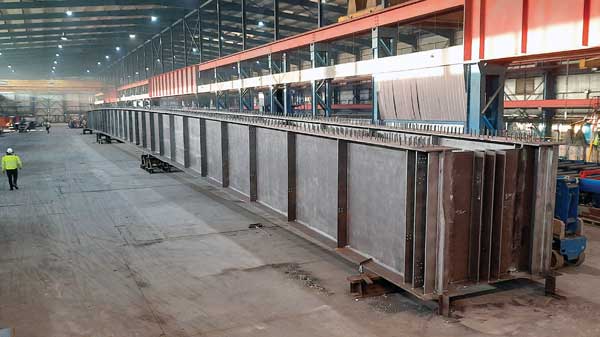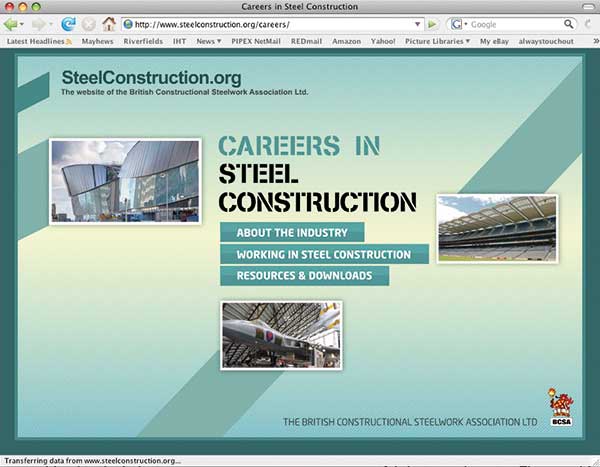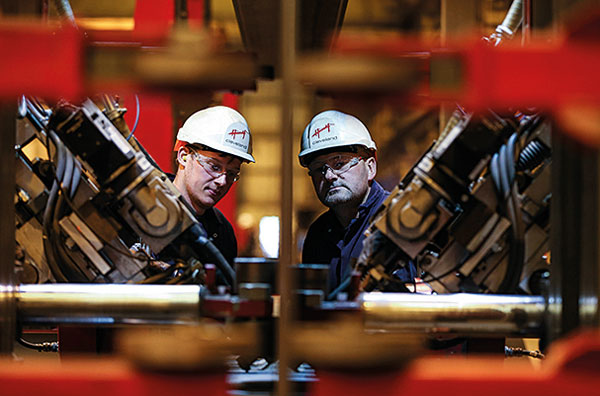Projects and Features
Training drive combats skills shortage
All secondary schools in the UK and Ireland have been targeted by the BCSA in a drive to increase awareness among school leavers about the potential careers in the steel construction industry. Over 50,000 copies of a new careers booklet have been sent to schools and a new website created to back the campaign at www.SteelConstruction.org/Careers.
The careers in steel construction drive comes in response to the shortfall in recruits to the industry
that is causing a wage spiral for certain key skills. Sue Sharples of Barrett Steel Buildings, Chair of the BCSA Training Committee, explained: “The sector hasn’t been as successful in atracting young people as it needs to be. Many steelwork contractors are suffering from staff shortages but are only able to recruit from each other, so in effect we are driving our own wage bills up but without attracting new blood to the industry.
“A year ago we recognised that action would have to be taken, targeted at schoolchildren to make them aware of the steelwork sector.” The sector also has an ageing workforce as a result of the shortfall in new recruiting.
Part of the problem may be that there is an insufficient bias towards steel in the education system. Ms Sharples said: “Colleges offer courses with a civil engineering content rather than the structural content that we need. The CAD packages people are being taught how to use are not often the ones most relevant to us either.
“We are talking to software providers to see if there is anything we can do, perhaps jointly, to get over this.”
There will be a pilot project this year of a new course aimed more at the requirements of steel construction contractors. “If this is successful we will roll it out in other regions,” says Ms Sharples.
The new booklet describes the steel construction industry and outlines the sorts of careers available, including estimator, design engineer, detailer, fabricator and erector. The new drive is in addition to the efforts made by individual steelwork contractors with local schools, sending people into schools to give career talks and organising visits to fabrication shops and design offices.
“We haven’t done that as a sector yet,” says Ms Sharples. “and perhaps we should. It has been very successful for those who make the effort though, and we have recruited two trainee positions that
way recently. Offering work placements has also been a good strategy that perhaps more of us should consider.”
 Corus has an active recruitment and training strategy offering apprenticeships, trainee positions, work placements graduate traineeships and postgraduate sponsorship to attract skills across all its production, engineering, sales and marketing and administrative activities.
Corus has an active recruitment and training strategy offering apprenticeships, trainee positions, work placements graduate traineeships and postgraduate sponsorship to attract skills across all its production, engineering, sales and marketing and administrative activities.
A new micro-site is reaching out to many school leavers interested in a career with Corus. By logging onto www.corusfutures.com, potential applicants can find out more about apprenticeships and trainee schemes as well as view a short movie clip about Corus and download application forms. Apprenticeships are available with the chance to specialise in mechanical, electrical, structural or specialist engineering trades.
Communicating the career opportunities available within the steel industry starts as early as primary and secondary school level. Corus undertakes this process in various ways including such programmes that include a team of employee volunteer Science Engineering Ambassadors at its major sites. At Scunthorpe alone, there are around 40 volunteers, who take turns at visiting the 85 Scunthorpe district primary and secondary schools. Their aim is to promote science, technology, engineering and maths in schools.
They also do the F1 challenge in schools, support the cur- riculum in primary schools and do the engineering challenge in secondary schools aimed at 13 year olds (Year 9) whereby they visit a school in the morning and brief the pupils on the chal- lenge that has to be completed by the children that day.
Corus’ 6th form link scheme, is also another programme whereby students are challenged with delivery of a real-
life project during their summer holiday break. Throughout their time with Corus, they gain valuable knowledge working alongside mentors in the steel industry, as well as hand-on experience of working in a work-based environment. At the end of their time they have to present the findings of their project back to their line manager and their parents. They are paid for this work.












